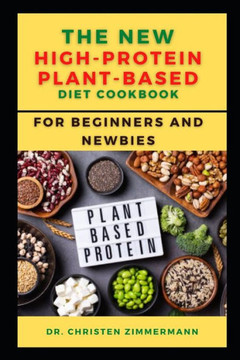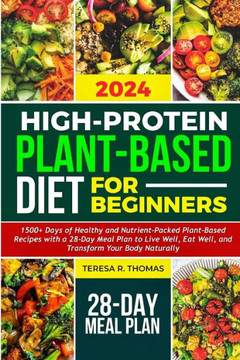
Independently Published
Essential Nutrients in High-Protein Plant-Based Foods: The Importance of a Plant-Based High-Protein Diet
Product Code:
9798868040580
ISBN13:
9798868040580
Condition:
New
$12.33

Essential Nutrients in High-Protein Plant-Based Foods: The Importance of a Plant-Based High-Protein Diet
$12.33
Essential Nutrients in High-Protein Plant-Based Foods Understanding the basics of a high-protein plant-based diet involves recognizing the abundant sources of plant-derived proteins available. Contrary to the common misconception that animal products are the sole or superior sources of protein, plant-based diets offer an extensive array of protein-rich options. Legumes such as lentils, chickpeas, and beans stand as pillars of this diet, offering substantial protein content along with fiber, vitamins, and minerals. Additionally, nuts and seeds like almonds, chia seeds, and hemp seeds provide a substantial protein punch, complemented by healthy fats and micronutrients vital for bodily functions.
Grains like quinoa, buckwheat, and whole grains contribute significantly to the protein profile, making them essential components of high-protein plant-based meals. These grains not only offer a complete range of amino acids but also serve as versatile staples in various cuisines, making them accessible and adaptable for diverse dietary preferences.
The importance of protein complementation and variety in a plant-based diet. Unlike animal-based proteins that generally contain all essential amino acids, some plant proteins may lack specific amino acids. However, by combining various plant protein sources throughout the day-such as beans and rice or hummus with whole-grain pita-individuals can easily ensure they obtain a full spectrum of essential amino acids, promoting optimal health and meeting their body's protein requirements. GRAB YOUR COPY!!!
Grains like quinoa, buckwheat, and whole grains contribute significantly to the protein profile, making them essential components of high-protein plant-based meals. These grains not only offer a complete range of amino acids but also serve as versatile staples in various cuisines, making them accessible and adaptable for diverse dietary preferences.
The importance of protein complementation and variety in a plant-based diet. Unlike animal-based proteins that generally contain all essential amino acids, some plant proteins may lack specific amino acids. However, by combining various plant protein sources throughout the day-such as beans and rice or hummus with whole-grain pita-individuals can easily ensure they obtain a full spectrum of essential amino acids, promoting optimal health and meeting their body's protein requirements. GRAB YOUR COPY!!!
| Author: Adriel Rowan |
| Publisher: Independently Published |
| Publication Date: Nov 17, 2023 |
| Number of Pages: 84 pages |
| Binding: Paperback or Softback |
| ISBN-10: NA |
| ISBN-13: 9798868040580 |





